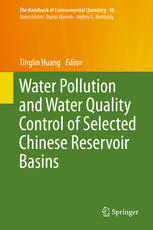
Water Pollution and Water Quality Control of Selected Chinese Reservoir Basins PDF
Preview Water Pollution and Water Quality Control of Selected Chinese Reservoir Basins
The Handbook of Environmental Chemistry 38 Series Editors: Damià Barceló · Andrey G. Kostianoy Tinglin Huang Editor Water Pollution and Water Quality Control of Selected Chinese Reservoir Basins The Handbook of Environmental Chemistry Founded by Otto Hutzinger Editors-in-Chief: Damia` Barcelo´ Andrey G. Kostianoy l Volume 38 Advisory Board: Jacob de Boer, Philippe Garrigues, Ji-Dong Gu, Kevin C. Jones, Thomas P. Knepper, Alice Newton, Donald L. Sparks Moreinformationaboutthisseriesathttp://www.springer.com/series/698 Water Pollution and Water Quality Control of Selected Chinese Reservoir Basins Volume Editor: Tinglin Huang With contributions by (cid:1) (cid:1) (cid:1) (cid:1) (cid:1) (cid:1) Y. Cheng H. Cong R. Hu T. Huang X. Li Y. Li (cid:1) (cid:1) (cid:1) (cid:1) (cid:1) (cid:1) W. Ma X. Qiu J. Shi X. Shi X. Sun Y. Sun (cid:1) (cid:1) (cid:1) (cid:1) (cid:1) (cid:1) G. Wen C. Xia J. Xu X. Yang F. Zhang H. Zhang (cid:1) S. Zhou Z. Zhou Editor TinglinHuang SchoolofEnvironmentalandMunicipalEngineering Xi’anUniversityofArchitectureandTechnology Xi’an,Shaanxi China ISSN1867-979X ISSN1616-864X (electronic) TheHandbookofEnvironmentalChemistry ISBN978-3-319-20390-4 ISBN978-3-319-20391-1 (eBook) DOI10.1007/978-3-319-20391-1 LibraryofCongressControlNumber:2015951716 SpringerChamHeidelbergNewYorkDordrechtLondon ©SpringerInternationalPublishingSwitzerland2016 Thisworkissubjecttocopyright.AllrightsarereservedbythePublisher,whetherthewholeorpartof the material is concerned, specifically the rights of translation, reprinting, reuse of illustrations, recitation, broadcasting, reproduction on microfilms or in any other physical way, and transmission or information storage and retrieval, electronic adaptation, computer software, or by similar or dissimilarmethodologynowknownorhereafterdeveloped. The use of general descriptive names, registered names, trademarks, service marks, etc. in this publicationdoesnotimply,evenintheabsenceofaspecificstatement,thatsuchnamesareexempt fromtherelevantprotectivelawsandregulationsandthereforefreeforgeneraluse. Thepublisher,theauthorsandtheeditorsaresafetoassumethattheadviceandinformationinthis book are believed to be true and accurate at the date of publication. Neither the publisher nor the authors or the editors give a warranty, express or implied, with respect to the material contained hereinorforanyerrorsoromissionsthatmayhavebeenmade. Printedonacid-freepaper Springer International Publishing AG Switzerland is part of Springer Science+Business Media (www.springer.com) Editors-in-Chief Prof.Dr.Damia` Barcelo´ Prof.Dr.AndreyG.Kostianoy DepartmentofEnvironmentalChemistry P.P.ShirshovInstituteofOceanology IDAEA-CSIC RussianAcademyofSciences C/JordiGirona18–26 36,NakhimovskyPr. 08034Barcelona,Spain 117997Moscow,Russia and [email protected] CatalanInstituteforWaterResearch(ICRA) H20Building ScientificandTechnologicalParkofthe UniversityofGirona EmiliGrahit,101 17003Girona,Spain [email protected] Advisory Board Prof.Dr.JacobdeBoer IVM,VrijeUniversiteitAmsterdam,TheNetherlands Prof.Dr.PhilippeGarrigues UniversityofBordeaux,France Prof.Dr.Ji-DongGu TheUniversityofHongKong,China Prof.Dr.KevinC.Jones UniversityofLancaster,UnitedKingdom Prof.Dr.ThomasP.Knepper UniversityofAppliedScience,Fresenius,Idstein,Germany Prof.Dr.AliceNewton UniversityofAlgarve,Faro,Portugal Prof.Dr.DonaldL.Sparks PlantandSoilSciences,UniversityofDelaware,USA v ThiSisaFMBlankPage The Handbook of Environmental Chemistry Also Available Electronically The Handbook of Environmental Chemistry is included in Springer’s eBook packageEarthandEnvironmentalScience. Ifalibrarydoes notoptfor thewhole package,thebookseriesmaybeboughtonasubscriptionbasis. ForallcustomerswhohaveastandingordertotheprintversionofTheHandbook ofEnvironmentalChemistry,weofferfreeaccesstotheelectronicvolumesofthe SeriespublishedinthecurrentyearviaSpringerLink.Ifyoudonothaveaccess,you canstillviewthetableofcontentsofeachvolumeandtheabstractofeacharticleon SpringerLink(www.springerlink.com/content/110354/). Youwillfindinformationaboutthe –EditorialBoard –AimsandScope –InstructionsforAuthors –SampleContribution atspringer.com(www.springer.com/series/698). Allfiguressubmittedincolorarepublishedinfullcolorintheelectronicversionon SpringerLink. Aims and Scope Since 1980, The Handbook of Environmental Chemistry has provided sound and solid knowledge about environmental topics from a chemical perspective. Presenting a wide spectrum of viewpoints and approaches, the series now covers topics such as local and global changes of natural environment and climate; anthropogenicimpactontheenvironment;water,airandsoilpollution;remediation and waste characterization; environmental contaminants; biogeochemistry; geo- ecology;chemicalreactionsandprocesses;chemicalandbiologicaltransformations as well as physical transport of chemicals in the environment; or environmental modeling. A particular focus of the series lies on methodological advances in environmentalanalyticalchemistry. vii ThiSisaFMBlankPage Series Preface Withremarkablevision,Prof. OttoHutzingerinitiatedTheHandbook ofEnviron- mentalChemistry in1980andbecamethe foundingEditor-in-Chief.Atthattime, environmental chemistry was an emerging field, aiming at a complete description of the Earth’s environment, encompassing the physical, chemical, biological, and geologicaltransformationsofchemicalsubstancesoccurringonalocalaswellasa global scale. Environmental chemistry was intended to provide an account of the impact of man’s activities on the natural environment by describing observed changes. Whileaconsiderableamountofknowledgehasbeenaccumulatedoverthelast three decades, as reflected in the more than 70 volumes of The Handbook of Environmental Chemistry, there are still many scientific and policy challenges ahead due to the complexity and interdisciplinary nature of the field. The series will therefore continue to provide compilations of current knowledge. Contribu- tions are written by leading experts with practical experience in their fields. The Handbook of Environmental Chemistry grows with the increases in our scientific understanding, and provides a valuable source not only for scientists but also for environmental managers and decision-makers. Today, the series covers a broad rangeofenvironmentaltopicsfromachemicalperspective,includingmethodolog- icaladvancesinenvironmentalanalyticalchemistry. Inrecentyears,therehasbeenagrowingtendencytoincludesubjectmatterof societal relevance in the broad view of environmental chemistry. Topics include life cycle analysis, environmental management, sustainable development, and socio-economic, legal and even political problems, among others. While these topics are of great importance for the development and acceptance of The Hand- bookofEnvironmentalChemistry,thepublisherandEditors-in-Chiefhavedecided tokeepthehandbookessentiallyasourceofinformationon“hardsciences”witha particular emphasis on chemistry, but also covering biology, geology, hydrology andengineeringasappliedtoenvironmentalsciences. Thevolumesoftheseriesarewrittenatanadvancedlevel,addressingtheneeds ofbothresearchersandgraduatestudents,aswellasofpeopleoutsidethefieldof ix
